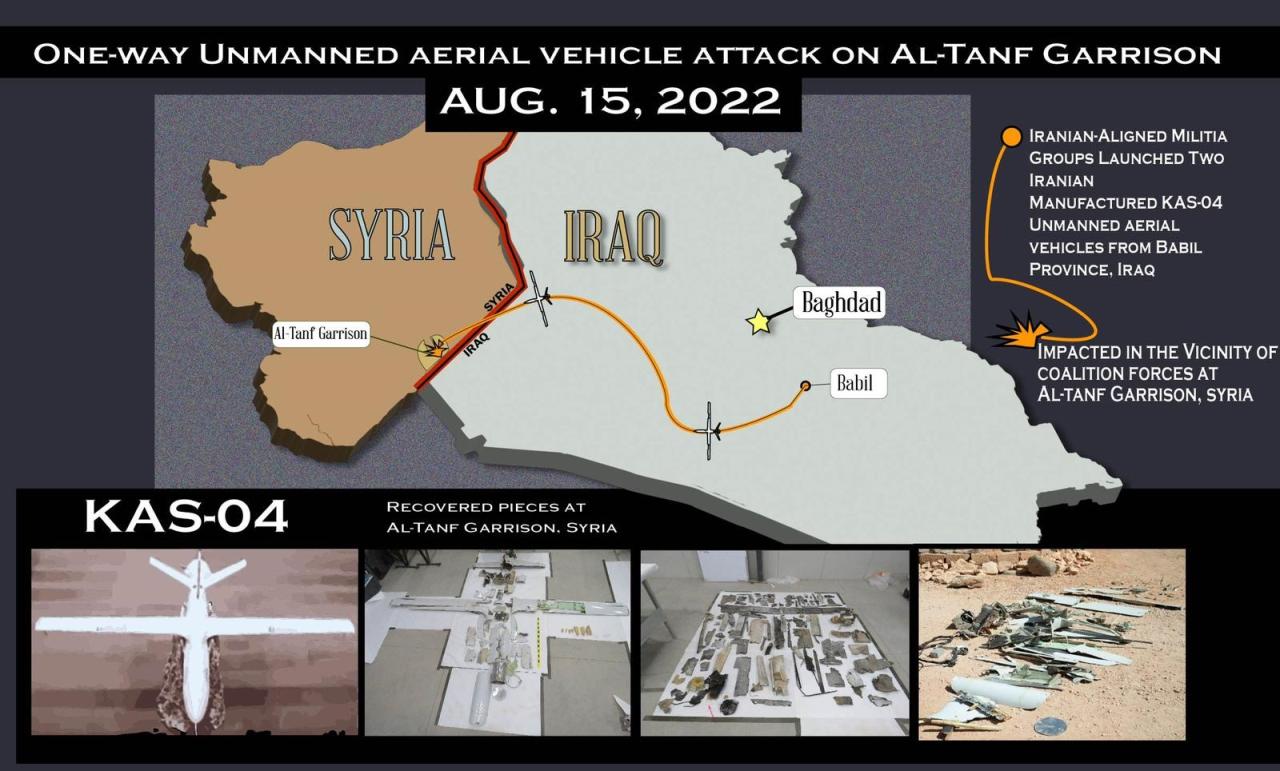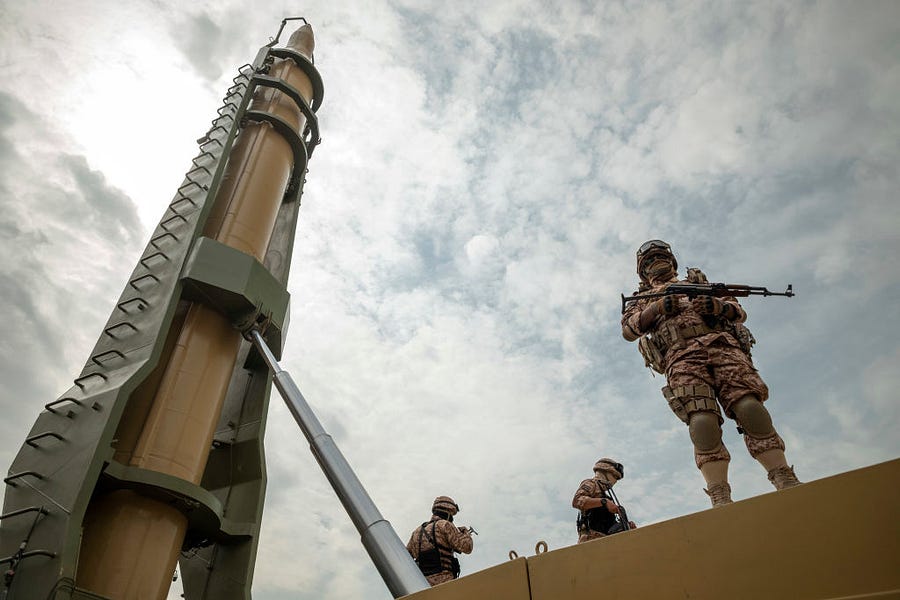After more than a year of indirect negotiations, Iran and the U.S. are unsteadily inching toward partially reviving the 2015 nuclear deal. But far from the negotiating table, a series of military confrontations could be undermining the rationale for an atomic accord.
On Tuesday, Iran attempted to commandeer an unmanned American maritime vessel in the Persian Gulf. Iranian state media claims the Islamic Revolutionary Guard Corps (IRGC) towed the drone to prevent accidental collisions before voluntarily releasing it to an American destroyer. Meanwhile, the U.S. Navy says American forces intervened to thwart Iran’s “unlawful” effort to capture the vessel.
This is only the latest in a string of escalations between Iran, the U.S., and their respective allies in the region.
Two long-range unmanned aerial vehicles (UAVs) struck a U.S. base in Syria on August 15. In a since-deleted graphic, U.S. Central Command (CENTCOM) traced the drone attack to the Babil province of Iraq and explicitly identified its culprits’ Iranian affiliation. The U.S. responded with strikes against facilities used by Iranian-sponsored groups in northeastern Syria. A CENTCOM colonel later told CNN that the strikes targeted nine bunkers, but the military spared two targets to avoid human casualties.

Then, last week, rocket fire from Iran-backed groups injured three U.S. service members in Kurdish-controlled Syria. The U.S. responded again with airpower and artillery, killing four militia fighters and destroying seven rocket launchers, according to CENTCOM.
Iran’s foreign ministry spokesman denied Tehran’s ties to the initial drone attack and denounced the U.S. response as a violation of Syria’s sovereignty. But Michael Knights, a security expert at the Washington Institute for Near East Policy, told The Dispatch that the UAVs’ flight path from a training camp run by an Iranian-backed Shiite militia in Iraq implicates the IRGC.
That CENTCOM retaliated for an attack of Iraqi origin on Syrian soil is notable but not surprising, experts say, given America’s precarious political and strategic presence in Iraq. The majority of U.S. airstrikes targeting Iranian surrogates under President Joe Biden have been in Syria, despite plenty of militia assets on both sides of the border. “It’s the administration pulling punches in Iraq and only firing in a place that the world, unfortunately, already does treat like a free fire zone,” Behnam Ben Taleblu, an Iran analyst at the Foundation for Defense of Democracies, said in an interview.
Israeli officials, as nervous about a renewed nuclear deal as they are Iran’s destabilizing behavior in the region, hoped the renewed violence would prompt the Biden administration to reconsider reviving a nuclear deal that could funnel billions of dollars to Iran and eventually its proxy forces. Iran currently uses Syria as a transit point to arm, fund, and train Lebanese Hezbollah and other Israeli adversaries.
“On the table right now is a bad deal. It would give Iran $100 billion a year,” Israeli Prime Minister Yair Lapid told Fox News last week. “It will fund more attacks on American bases in the Middle East.”
As talks between the U.S. and Iran continue, Israel is also fighting Iranian forces in the region. As recently as last Thursday, Israeli airstrikes in Syria destroyed a warehouse containing more than 1,000 Iranian-made medium-range and surface-to-surface missiles. Since 2011, Israel has carried out hundreds of such strikes.
Simultaneously, Israel has targeted high-ranking Iranian personnel. Though Iran rarely acknowledges such incidents, a handful of “defenders of the shrine”—a term used to describe Iranian military operatives in Syria and Iraq—have died while deployed this year. Just last week, Iran’s state broadcaster announced that IRGC Gen. Abolfazl Alijani had been “martyred” serving as a military adviser in Syria. “The Israelis know in very fine grained detail where these guys are based,” Knights added.
In an interview with The Dispatch, Jason Brodsky of United Against Nuclear Iran contrasted Jerusalem’s consistency with Washington’s two-pronged approach of distinguishing diplomacy with Iran from countering its regional terrorism. The Iranians feared “that retaliating against Israel would be a bridge too far because of the deterrence that Israel has created” he said, “so the Iranian-linked operators decided to target the next best thing, which is the United States.”
These clashes signify more than a minor military tit-for-tat. They are part of the Islamic Republic’s long campaign to dominate the region. Tehran entrenched itself in Syria by working with Russia to save the collapsing regime of Bashar al-Assad, and it supports influential militias in an increasingly unstable Iraq. The country aspires to advance its “axis of resistance” by transforming Iran-backed fighters into quasi-government actors with the same sway and perceived legitimacy as Hezbollah in Lebanon.
Iran’s footholds in Syria and Iraq provide the country a staging ground for attacks on American troops and allied forces. All the while, Iranian negotiators see their strength across the region as leverage to push the U.S. toward more favorable terms in the impending nuclear deal.
“The Iranian regime uses these kinds of operations to complement its negotiating strategy. They’re not some freelance operation,” Brodsky said. “They are able to both pressure and negotiate at the same time. The United States has to do the same, and I think the retaliatory strikes in Syria were a step in that direction. Whether they reestablish meaningful deterrence in the long run remains to be seen.”







Please note that we at The Dispatch hold ourselves, our work, and our commenters to a higher standard than other places on the internet. We welcome comments that foster genuine debate or discussion—including comments critical of us or our work—but responses that include ad hominem attacks on fellow Dispatch members or are intended to stoke fear and anger may be moderated.
With your membership, you only have the ability to comment on The Morning Dispatch articles. Consider upgrading to join the conversation everywhere.